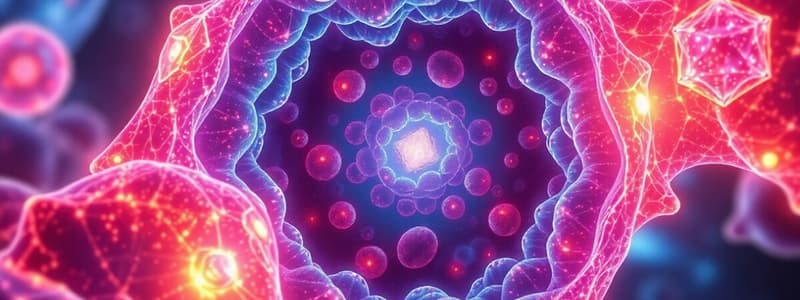Podcast
Questions and Answers
What is the primary function of mitochondria in a cell?
What is the primary function of mitochondria in a cell?
- Production of ATP (correct)
- Photosynthesis
- Protein synthesis
- Energy storage
What feature of the inner membrane of mitochondria contributes to ATP production?
What feature of the inner membrane of mitochondria contributes to ATP production?
- It contains cristae that increase surface area. (correct)
- It is impermeable to all substances.
- It is completely smooth.
- It is thicker than the outer membrane.
Which of the following statements is true regarding the structure of mitochondria?
Which of the following statements is true regarding the structure of mitochondria?
- The outer membrane contains cristae.
- The outer membrane is impermeable.
- The inner membrane has a matrix containing enzymes. (correct)
- Mitochondria have only one membrane.
Why do mitochondria have their own DNA and ribosomes?
Why do mitochondria have their own DNA and ribosomes?
How does the cristae of mitochondria enhance ATP production?
How does the cristae of mitochondria enhance ATP production?
What are the two primary membranes of mitochondria?
What are the two primary membranes of mitochondria?
What occurs when ATP molecules are broken down?
What occurs when ATP molecules are broken down?
What is the primary function of mitochondria in eukaryotic cells?
What is the primary function of mitochondria in eukaryotic cells?
What percentage of the outer membrane consists of lipids?
What percentage of the outer membrane consists of lipids?
What type of proteins form channels in the outer membrane of mitochondria?
What type of proteins form channels in the outer membrane of mitochondria?
What is the molecular weight limit for molecules passing through the outer membrane?
What is the molecular weight limit for molecules passing through the outer membrane?
What is the role of ATP in eukaryotic cells?
What is the role of ATP in eukaryotic cells?
Which component is NOT found in the outer membrane of mitochondria?
Which component is NOT found in the outer membrane of mitochondria?
Which of the following best describes the outer membrane of mitochondria?
Which of the following best describes the outer membrane of mitochondria?
What process allows cells to convert energy stored in chemical bonds into usable ATP?
What process allows cells to convert energy stored in chemical bonds into usable ATP?
What are the long folds of the inner membrane called?
What are the long folds of the inner membrane called?
What factors influence the conductivities of the mitochondrial membranes?
What factors influence the conductivities of the mitochondrial membranes?
What is the main characteristic of the lipid bilayer of the inner membrane?
What is the main characteristic of the lipid bilayer of the inner membrane?
What is the role of integral proteins in the inner membrane?
What is the role of integral proteins in the inner membrane?
What is the structure of the cristae in most mitochondria?
What is the structure of the cristae in most mitochondria?
Where is the mitochondrial ATP synthase activity primarily located?
Where is the mitochondrial ATP synthase activity primarily located?
What defines the intermembrane space in mitochondria?
What defines the intermembrane space in mitochondria?
What does the intercristal space contain?
What does the intercristal space contain?
Which components are intercalated in the inner membrane of mitochondria?
Which components are intercalated in the inner membrane of mitochondria?
What is the primary function of the cristae in mitochondria?
What is the primary function of the cristae in mitochondria?
What is one of the main functions of the enzymes found in the mitochondrial matrix?
What is one of the main functions of the enzymes found in the mitochondrial matrix?
Which component of the mitochondrion encloses the matrix?
Which component of the mitochondrion encloses the matrix?
What is the primary function of sap vacuoles in plant cells?
What is the primary function of sap vacuoles in plant cells?
What is a symptom commonly associated with mitochondrial diseases?
What is a symptom commonly associated with mitochondrial diseases?
What types of changes can lead to mitochondrial diseases?
What types of changes can lead to mitochondrial diseases?
Which type of vacuole is most commonly found in fat cells?
Which type of vacuole is most commonly found in fat cells?
What is the membrane surrounding a vacuole called?
What is the membrane surrounding a vacuole called?
Mitochondrial ribosomes are similar to those of which type of organism?
Mitochondrial ribosomes are similar to those of which type of organism?
What is the fluid present inside the vacuole referred to as?
What is the fluid present inside the vacuole referred to as?
What is contained within the mitochondrial matrix?
What is contained within the mitochondrial matrix?
What structure is formed by the folds of the inner membrane of the mitochondrion?
What structure is formed by the folds of the inner membrane of the mitochondrion?
How are vacuoles typically formed?
How are vacuoles typically formed?
Which pigment do sap vacuoles store in plants?
Which pigment do sap vacuoles store in plants?
Which of the following is NOT a potential outcome of mitochondrial diseases?
Which of the following is NOT a potential outcome of mitochondrial diseases?
What is the purpose of matrix granules in the mitochondrial matrix?
What is the purpose of matrix granules in the mitochondrial matrix?
What role do sap vacuoles play in maintaining plant cell structure?
What role do sap vacuoles play in maintaining plant cell structure?
Which outer part of the mitochondrion separates it from the cytoplasm?
Which outer part of the mitochondrion separates it from the cytoplasm?
What type of vacuole is responsible for expelling excess water in certain protozoa?
What type of vacuole is responsible for expelling excess water in certain protozoa?
Which of the following is NOT a type of vacuole mentioned?
Which of the following is NOT a type of vacuole mentioned?
What materials do vacuoles generally contain?
What materials do vacuoles generally contain?
Flashcards are hidden until you start studying
Study Notes
Mitochondria Overview
- Mitochondria are double-membrane organelles known as the "powerhouse of the cell."
- They produce ATP (adenosine triphosphate), the usable form of energy for cells.
- Enzymes convert energy from carbohydrates and fatty acids into ATP through oxidative phosphorylation.
Structure of Mitochondria
- Composed of an outer and inner membrane.
- The outer membrane is smooth and porous, allowing small molecules to pass.
- The inner membrane is highly folded into cristae, increasing surface area for ATP production.
- Contains a matrix rich in enzymes necessary for ATP synthesis and has its own DNA and ribosomes, enabling protein synthesis.
Function of Mitochondria
- ATP produced is vital for cellular functions such as movement, reproduction, and synthesis of compounds.
- Plays a crucial role in the oxidation of organic molecules to generate energy.
Outer Membrane Characteristics
- Composed of 50% lipids and 50% proteins.
- Contains transmembrane proteins called porins that form channels for small molecules.
- Allows the passage of molecules with molecular weights up to 10,000 Da.
Inner Membrane Characteristics
- Contains long folds (cristae) to enhance surface area.
- Lipid composition varies and includes unusual phospholipids.
- Highly impermeable to ions and selectively permeable to required small molecules.
- Houses components of the electron transport chain and ATP synthase activity.
Membrane-Limited Spaces
- Creates intermembrane space between the inner and outer membranes.
- The matrix space is enclosed by the inner membrane and contains the mitochondrial matrix.
Mitochondrial Matrix
- Composed of water, solutes, and matrix granules for calcium ion concentration regulation.
- Contains circular DNA and ribosomes.
- Enzymes in the matrix are involved in critical processes including the citric acid cycle and lipid oxidation.
Mitochondrial Diseases
- Include over 40 conditions linked to mitochondrial dysfunction, due to mutations in nuclear or mitochondrial DNA.
- Symptoms vary based on affected tissues, including muscle weakness, digestive problems, and developmental delays.
Vacuoles Overview
- Non-cytoplasmic areas in cells, separated by a membrane known as tonoplast.
- Store water, minerals, and other substances; vital for structure and osmotic pressure.
Types of Vacuoles
- Sap Vacuoles: Abundant in plant cells for storing sap, maintaining turgidity, and osmotic pressure.
- Contractile Vacuoles: Expandable and collapsible; help segregate substances and maintain osmotic balance.
- Food Vacuoles: Store nutrients and participate in digestion via phagocytosis.
- Air Vacuoles: Found in prokaryotes; store gases for buoyancy and structural strength.
Functions of Chloroplasts
- Key roles in photosynthesis and synthesis of nucleic acids, proteins, fatty acids, and vitamins.
Peroxisomes
- Single-membrane spherical organelles involved in hydrogen peroxide metabolism.
- Contain oxidases that produce hydrogen peroxide and catalases that break it down.
- Enzymes in peroxisomes assist in various metabolic reactions, including lipid degradation.
Studying That Suits You
Use AI to generate personalized quizzes and flashcards to suit your learning preferences.




